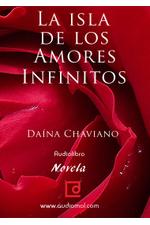Blog del Instituto Cervantes de Dublín
Torre Martello
Interview with María Negroni
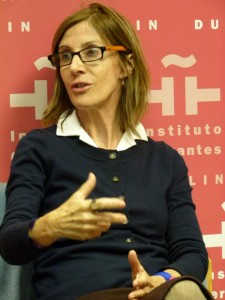
Interview with Maria Negroni held on the 3rd of November 2012 in the Dámaso Alonso Library, Instituto Cervantes Dublin, on the occasion of her participation in the ISLA Festival round table discussion “Conflicts: Fiction, Humour and Society” along with Lorenzo Silva, Bernardo Toro and Niamh O’Connor.
María Negroni (Rosario, Argentina, 1951) is a poet, essayist and novelist. As a poet, she has published, among other books, Islandia (winner of the award for the best book of poetry in translation, 2001, from the PEN American Center in New York), El Viaje de la Noche (The Journey of the Night), Arte y Fuga (Art and Fugue), La Boca del Infierno (Hell’s Mouth) and Cantar Nada (Sing Nothing). She has also published two novels and several books of essays. She has translated works by Emily Dickinson, Louise Labé, Valentine Penrose, Georges Bataille, H.D., Charles Simic and Bernard Noël among others, as well as La Pasión del Exilio (The Passion of Exile), an anthology of female American poets (2007). Her book Galeria Fantástica (Fantastic Gallery) received the International Essay Award of the 21st century (Mexico).
Alfonso Fernández Cid: María, in your literature the word “island” is repeated on several occasions, the same word that gives its name to this literary festival. What does this word suggest to you?
María Negroni: The word “island” is almost a synonym for poetry. Because in general an island, at least in an imaginary sense, suggests a land surrounded by water, an isolated territory. It suggests a virgin terrain, empty, full of possibilities. An island is also like a human being. We could say that people in reality are islands surrounded by death. In this isolated space, it is possible to create new worlds. The island is like a miniature version of a great continent, just as a poem is. It is like a universe, tiny in size, but open to endless possibilities.
One of my first books is called Islandia (Iceland), which is the territory of the island, in the same way that one says Disneyland, Disney-country. Islandia is the country of the island. I wrote it a long time ago and it was, I would say, a journey but also a kind of tribute to Jorge Luis Borges, who loved Icelandic literature. Of course in my case I created a kind of cocktail because I united Icelandic fairy mythology with a story of a contemporary woman’s journey to another island, in this case Manhattan.
Alfonso Fernández Cid: In relation to this, you have mentioned the principle of the feminine in poetry and fantasy literature. What in your opinion is its true dimension and importance?
María Negroni: This would make for a lengthy discussion, but we could distill it by saying that in fantasy literature and Gothic literature (of which the fantastic is a derivation), and in poetry, there is a principle of insubordination against clear, rational, illuminated thought, reason and order. It seems to me that in these genres, as well as in poetry, there as a kind of emergence from below that comes so as to erode or destroy. And that could be compounded by saying that this emergence is desire. Desire as a disruptive concept is, for me, feminine. If you look you in great works of Gothic or Fantasy literature, always that which is below, in the crypts, in basements, this always has to do with the principle of the feminine, with the night, with the body – desire, basically. The same thing happens with poetry. This is why poetry is so important, because it is here where words realise, so to speak, their greatest anti-authoritarian potential.
Alfonso Fernández Cid: Is the Gothic still present nowadays Latin American literature?
Maria Negroni: Yes. Not in the same way as in 18th-century English literature, but it does have a presence, given that desire, all things nocturnal, that which escapes the world of reason, will never cease to exist. It is always shifting, always taking new faces and new expressions. Latin American fantasy literature of the 20th century is a direct derivation of the English gothic novel. Again I say – a direct derivation. In my book The fantastic Gallery I try to test this premise. The Gothic is present in American film noir of the first half of the 20th century. Do not forget that the American directors who made film noir were German Expressionists who arrived fleeing Nazism and who reinvented Hollywood. The Gothic is very present, with other faces and other names. But it remains in force.
Alfonso Fernández Cid: When you write do you do so from experience or from the unknown?
María Negroni: I have always thought that poetry is a kind of epistemology of unknowing. That is, for one to write, one has to venture into the unknown. Because as George Steiner says, beauty is connected to the idea of rupture, the rupture of the known, the conventional. If one was to repeat something they know already, no aesthetic effect is produced. This aesthetic effect arises from questions that have no answers. For this reason, writing comes from the place that remains unknown and, in any event, the work of the poet is delve into that unknown, because you can always explore further. One can always, as Beckett says, fail better.
Alfonso Fernández Cid: What do you think is the paradise, for a poet? What would be your paradise as a poet?
María Negroni: The first thing that comes into my head is to tell you that paradise would be a library. Because books, in my opinion, are in reality conversations with other books written by other authors. They are like conversations with other souls. So a library would be paradise par excellence. From a personal perspective, I think that the answer would be the same. To read and to write are the same thing. I would almost say that the job of the reader is the most difficult literary occupation – to learn to read. Then I think so, yes. I don’t know if it is wrong to say this, but with books I am absolutely happy.
Alfonso Fernández Cid: You have been, for some years now, residing in the United States, specifically in New York. Has the city left a mark upon any of your works?
María Negroni: I think it has influenced me a lot. I came to New York in 1985. I have had two stages there, with a period in Buenos Aires in between. And yes, New York left me spinning. It is a city that I spent ten years discovering, exploring. I was absolutely fascinated by the city during the first decade, while I was a student. It was a very different New York; I was someone else also. These days the city is a little less interesting that how it appeared to me in the 1980s. It is a city that is has become, as they say in English, “gentrified”. It is a neater city, cleaner, richer. I prefered it before, when I was dirtier, more dingy
Alfonso Fernández Cid: Perhaps you were influenced by the fact that before, it maintained a charm of being an unfathomable city.
María Negroni: This could be true. But now it has also become transformed. Today the city is a little more homogeneous, and very rich. It is like a shopping mall, a huge store. Even the neighbourhoods – where artists hang out, now they have all gone to Brooklyn. Brooklyn is now the new Manhattan. So i find it less interesting, but in any case it is a city that has given me a lot, and I would do it all again if I had the chance. And furthermore, for all the themes that are being discussed in this festival: the space in-between, dislocation, departure from a place, [New York] has been fundamental for me because it has allowed me to have a detached attitude towards my own environment, the Argentinean. It has given me a lot of freedom. In Argentina, I think that I am a sort of unclassifiable writer, that I move constantly, fleeing genres. New York legitimized me in this sense.
Alfonso Fernández Cid: It gave you a certain freedom.
Maria Negroni: Completely. I don’t know if I would have had that freedom if I remained in Buenos Aires.
Recommended Links
- [Vídeo] Interview with María Negroni at the Instituto Cervantes in Dublín by Alfonso Fernández Cid.
[Video] Bernardo Toro en el Festival Isla de Literatura / Isla Literary Festival
Bernardo Toro participó en la mesa redonda “Conflictos: ficción, humor y sociedad” junto a Lorenzo Silva, María Negroni y Niamh O’Connor. Bernardo Toro es entrevistado por Carmen Sanjulián. Edición de video: Cris Méndez.
Memoria histórica, conflictos nacionales o internacionales, crimen y cotidianidad serán temas presentes en esta mesa gracias a la creación literaria de los invitados Lorenzo Silva, Bernardo Toro, María Negroni y Niamh O’Connor. Modera: Kate Quinn (NUI Galway)
Bernardo Toro, escritor radicado en Francia, nació en Santiago de Chile. En 1983 salió de su país para continuar sus estudios en París, donde obtuvo su máster sobre la obra de Marcel Proust en la Universidad de La Sorbona. Entre 1988 y 1993, dirigió la revista de arte Lugares Extremos. Desde 1999 dirige la revista Rue Saint Ambroise, publicación dedicada al cuento contemporáneo.
Actualmente es profesor y traductor literario. Es autor de dos novelas: Contretemps (A Contratiempo) (Les petits matins, 2006) y De fils à fils (De hijo a hijo) (Sotck, 2010). Su próxima novela, Qui d’autre à part nous, se publicará en el 2013.
Historical memory, national or international conflicts and crime and daily life were the topics at this table thanks to literary works by guests Lorenzo Silva, Bernardo Toro, María Negroni and Niamh O’Connor. Chaired by Kate Quinn (NUI Galway).
Bernardo Toro (Santiago, Chile) lives in France. He left Chile in 1983 to complete a masters degree at the Sorbonne University of Paris with a dissertation about Marcel Proust´s work.
From 1988 to 1993 he was editor in chief of the art magazine Lugares Extremos. Since 1999, while working as lecturer and literary translator, he has been editor in chief of the magazine Rue Saint Ambroise, a publication dedicated to contemporary short stories.
He is the author of two novels: Contretemps (2006) and De fils à fils (2010). His next novel, Qui d’autre à part nous is due for release in 2013.
Mesa redonda: Conflictos: ficción, humor y sociedad | Round table discussion: Conflicts: fiction, humour and society
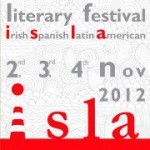 Como todos sabéis, hoy estrenamos festival, el Festival ISLA de Literatura, a las cuatro de la tarde, que será inaugurado oficialmente, a las 6:30, por el presidente de Irlanda, Sr. Michael D. Higgins.
Como todos sabéis, hoy estrenamos festival, el Festival ISLA de Literatura, a las cuatro de la tarde, que será inaugurado oficialmente, a las 6:30, por el presidente de Irlanda, Sr. Michael D. Higgins.
Mañana sábado, día 3 de noviembre, comenzaremos a las 11:30 con la mesa redonda que lleva por título «Escritores sin escrúpulos: intimidad, violencia y humor en la literatura», y continuaremos con «Cruzando fronteras: Poesía en la maleta». A las 3:30 compartiremos lecturas con varios de nuestros autores y a las 4:30 daremos paso a la mesa redonda «Conflictos: ficción, humor y sociedad», que contará con la participación de Lorenzo Silva, Bernardo Toro y Declan Bruke. Moderará la mesa Kate Quinn, de la Universidad Nacional de Irlanda en Galway.
Lorenzo Silva (Madrid, España, 1966), galardonado con el Premio Planeta hace apenas dos semanas, ha escrito, entre otras, las novelas La flaqueza del bolchevique (finalista del Premio Nadal 1997) que ha sido llevada al cine por Manuel Martín Cuenca, y Carta blanca (Premio Primavera 2004). Ha publicado también libros infantiles y juveniles, además de ensayos. Es especialmente conocido por la serie policíaca protagonizada por los investigadores Bevilacqua y Chamorro, iniciada con El lejano país de los estanques (Premio Ojo Crítico 1998), y a la que siguió, entre otras, El alquimista impaciente (Premio Nadal 2000), adaptada al cine por Patricia Ferreira. Su último libro publicado es Niños Feroces (2011). Su obra ha sido traducida a numerosos idiomas.
Bernardo Toro (Santiago, Chile) es un escritor radicado en Francia. En 1983 salió de Chile para continuar sus estudios en París, donde realizó un máster sobre la obra de Marcel Proust en la Universidad de La Sorbona. Entre 1988 y 1993, dirigió la revista de arte Lugares Extremos. Desde 1999 dirige la revista Rue Saint Ambroise, publicación dedicada al cuento contemporáneo. Actualmente es profesor y traductor literario. Es autor de dos novelas: Contretemps (A Contratiempo) (Les petits matins, 2006) y De fils à fils (De hijo a hijo) (Sotck, 2010). Su próxima novela, Qui d’autre à part nous, se publicará en el 2013.
Declan Burke ha publicado cuatro novelas hasta el día de hoy: Eightball Boogie (2003), The Big O (2007), Absolute Zero Cool (2011) y Slaughter’s Hound (2102). Absolute Zero Cool fue una de las finalistas en la categoría de novela negra para el premio Irish Book 2011 y recibió el premio Goldsboro Last Laugh a la mejor novela negra humorística en 2012. Es además el editor de These Green Streets: Irish Crime Writing in the 21st Century (2011) y co-editor, junto a John Connolly, de Books to Die For( 2012). Tiene una página web dedicada a la novela negra irlandesa llamada Crime Always Pays.
Cerraremos el día con la proyección del documental Neruda, el hombre y su obra.
We invite you to participate in a the round-table “Conflicts: fiction, humour and society” as part of the ISLA Festival. The event will be held the 3rd of November at 16:30 at Café Literario.
Historical memory, national or international conflicts and crime and daily life will be topics at this table thanks to literary works by guests Lorenzo Silva, Bernardo Toro and Declan Burke. Chaired by Kate Quinn (NUI Galway).
Lorenzo Silva (Madrid, Spain, 1966) is author of novels such as La Flaqueza del Bolchevique which was short listed for the Nadal Award in 1997, and was adapted for cinema by Manuel Martín Cuenca, andCarta Blanca which won the Primavera Award in 2004. He has also published books for children and young adults, as well as essays. He is especially known for the crime series starring detectives Bevilacqua and Chamorro, the series started with El lejano país de los estanques winner of the Ojo Crítico Award in 1998, and was followed by El Alquimista Impaciente winner of the Nadal Award in 2000, the later being adapted to cinema by Patricia Ferreira. His latest book Niños Feroces was published in 2011. His books have been translated into numerous languages such as Russian, French, German, Italian and Greek.
Bernardo Toro (Santiago, Chile) lives in France. He left Chile in 1983 to complete a masters degree at the Sorbonne University of Paris with a dissertation about Marcel Proust´s work. From 1988 to 1993 he was editor in chief of the art magazine Lugares Extremos. Since 1999, while working as lecturer and literary translator, he has been editor in chief of the magazine Rue Saint Ambroise, a publication dedicated to contemporary short stories. He is the author of two novels: Contretemps (2006) and De fils à fils (2010). His next novel, Qui d’autre à part nousis due for release in 2013.
Declan Burke has published four novels to date:Eightball Boogie (2003), The Big O (2007), Absolute Zero Cool (2011) and Slaughter’s Hound (2102).Absolute Zero Cool was shortlisted in the crime fiction section for the Irish Book Awards 2011, and received the Goldsboro Last Laugh Award for Best Humorous Crime Novel in 2012. He also is the editor of Down These Green Streets: Irish Crime Writing in the 21st Century (2011), and the co-editor, with John Connolly, of Books to Die For (2012). He hosts a website dedicated to Irish crime fiction called Crime Always Pays.
Hoy leemos con | Today we are reading with: Elia Barceló, Kevin Barry, Christopher Domínguez Michael, Keith Ridgway and María Negroni
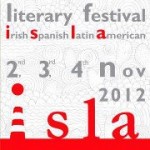 Ya solo quedan tres días para que de comienzo el esperado Festival ISLA de Literatura. Dentro de su programación, el sábado 3 de noviembre podremos disfrutar de un recital poético que dará comienzo a las tres y media de la tarde en nuestro Café Literario.
Ya solo quedan tres días para que de comienzo el esperado Festival ISLA de Literatura. Dentro de su programación, el sábado 3 de noviembre podremos disfrutar de un recital poético que dará comienzo a las tres y media de la tarde en nuestro Café Literario.
Elia Barceló, Kevin Barry, Christopher Domínguez Michael, Keith Ridway y María Negroni compartirán sus mejores textos con los asistentes al acto y unirán sus voces a este festival. La presentación, en este caso, correrá a cargo de Lorraine Kelly, de la Universidad de Galway (National University of Ireland). Pero, ¿quiénes son estos autores?, ¿no los conoces todavía?.
Elia Barceló (Alicante, España, 1957) ha publicado novelas policíacas, históricas, de ciencia ficción y género fantástico para adultos, así como novelas para jóvenes y ensayos. Ha sido traducida a diecisiete idiomas, entre ellos el inglés. Sus novelas traducidas al inglés hasta la fecha son: Corazón de tango (2007) (Heart of Tango, 2010) y El secreto del orfebre (2003) (The Goldsmith’s Secret, 2011).
Kevin Barry (Limerick). Su primer libro de relatos,There are Little Kingdoms, ganó el Premio Rooney de Literatura Irlandesa en 2007. Ha escrito sobre viajes y literatura para The Guardian, The Irish Times, The Sydney Morning Herald y muchas otras publicaciones. Su primera novela, City of Bohane (2011) ha sido galardonada en Reino Unido con el Authors’ club Best First Novel Award, que premia a la mejor primera novela del año.
Christopher Domínguez Michael (Ciudad de México, México, 1962), historiador y ensayista, es uno de los más conocidos críticos literarios hispanoamericanos. Es autor de numerosas publicaciones, siendo su última publicación Profetas del pasado. Quince voces sobre la historiografía de México (2011). Su Diccionario crítico de la literatura mexicana, 1955–2005 ha sido traducido y actualizado al inglés en 2012.
Keith Ridgway (Dublín, Irlanda, 1965). Su primera obra de ficción fue Horses (1997), a la que siguieronThe Long Falling (1998), Standard Time (2000); un libro de relatos, The Parts (2003); Animals (2006) yGoo Book (2011). Su última novela publicada esHawthorn & Child (2012). Ha recibido numerosos premios, entre ellos el Prix Femina Etranger y el Prix Premier Roman en París en 2001 por The Long Fallingbajo el título en francés Mauvais Pente, y el premio Rooney de literatura irlandesa en 2001. Las obras de Ridgway han sido traducidas a varios idiomas entre otros, el español.
María Negroni (Rosario, Argentina, 1951) es poeta, ensayista y novelista. Como poeta, ha publicado, entre otros libros: El viaje de la noche, Arte y Fuga,La Boca del Infierno y Cantar la nada. También ha publicado varios libros de ensayos y dos novelas. Su libro Islandia recibió el premio del PEN American Center en Nueva York al mejor libro de poesía en traducción del año (2001) y Galería Fantástica recibió el Premio Internacional de Ensayo de Siglo XXI (México). Su obra ha sido traducida al inglés, francés, sueco e italiano.
This event of ISLA Literary Festival will be an outstanding poetry reading in November 3rd at 3:30 at Café Literario.
Authors will read a selection of some of their best work in their original language in this poetry reading. Introduced by: Lorraine Kelly (NUI Galway).
Elia Barceló (Alicante, Spain, 1957) has published crime, historical, science fiction and fantastic novels for adults, as well as young adult books and essays. Her work has been translated into several languages, Spanish between others. Her novels translated into English are: Corazón de tango (2007), translated into English under the name Heart of Tango (2010) andThe Goldsmith’s Secret (2011), a translation of El secreto del orfebre (2003).
Kevin Barry was born in Limerick and now lives in Sligo. His first collection of short stories, There Are Little Kingdoms, won the Rooney Prize for Irish Literature in 2007. He has written about travel and literature for The Guardian, The Irish Times, The Sydney Morning Herald and many other publications. His debut novel City of Bohane (2011) recently won the Authors’ Club Best First Novel award in Britain.
Christopher Domínguez Michael (Mexico City, Mexico, 1962) is a historian and essayist, and also one of the most famous Hispanic-American literary critics. He is the author of several works, being his latest novel Profetas Del Pasado. Quince Voces Sobre La Historiografía De México was published in 2011. Since 2010 he has also worked as associate researcher at the Colegio de México. His workDiccionario Crítico de la Literatura Mexicana, 1955-2005 (Critical Dictionary of Mexican Literature, 1955–2010) has been translated into English and was updated in 2012.
María Negroni (Rosario, Argentina, 1951) is a poet, essayist and novelist. She has published numerous poetry books: Islandia, El viaje de la noche, Arte y Fuga, La Boca del infierno and Cantar la nada, to mention just a few. She has also published various essays collections and two novels. Her book Islandiareceived the 2001 PEN American Center Award for best book of poetry in translation. She was awarded the 21st Century International Essay Prize (Mexico) for her book Galería Fantástica. Her work has been translated into English, French, Swedish and Italian.
Keith Ridgway (Dublin, 1965). His first fictional prose Horses was published in 1997, followed by The Long Falling (1998), Standard Time (2000). A collection of short fiction, The Parts (2003), Animals(2006), Goo Book (2011) and Hawthorn & Child(2012). He has received numerous awards such as the Prix Femina Etranger and the Prix Premier Roman in Paris in 2001 for The Long Falling, under its French title of Mauvaise Pente, and The Rooney Prize For Irish Literature in 2001. His work has been translated into several languages and has been published in Spain, between other countries.
Mesa redonda: Cruzando fronteras: Poesía en la maleta | Round table discussion: Crossing frontiers: Poetry in the suitcase
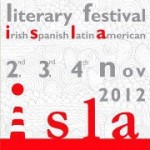 Le invitamos a una interesante discusión literaria que tendrá lugar el 3 de Noviembre a las 14:00, Festival Literario ISLA.
Le invitamos a una interesante discusión literaria que tendrá lugar el 3 de Noviembre a las 14:00, Festival Literario ISLA.
La poesía llega al festival ISLA con los autores Omar Pérez, Diego Valverde Villena, Máighréad Medbh y Lorna Shaughnessy. Cuatro formas de construir desde lo poético para enriquecer el panorama contemporáneo. Modera: Catherine O’Leary (NUI Maynooth)
Omar Pérez (La Habana, Cuba, 1964) es poeta, ensayista y traductor, además de periodista, crítico de teatro y cine, editor y locutor de radio. Su última publicación es la colección de ensayos El corazón mediterráneo (2011). Como poeta ha publicado Algo de lo sagrado (1996), ¿Oíste hablar del gato de pelea? (1999), Canciones y Letanías (2002) y Lingua Franca (2009). En inglés ha publicado Something of the Sacred (2007), traducción de Algo de lo sagrado, a cargo de Kristin Dykstra y Did you hear about the fighting cat? (2010).
Diego Valverde Villena (Lima, Perú, 1967). Poeta español y peruano, de ascendencia boliviana. En 2011 publicó su libro de poemas Un segundo de vacilación. Ha traducido obras de Conan Doyle, Kipling, John Donne, Ezra Pound, Valery Larbaud, Nuno Júdice, E.T.A. Hoffmann y Paul Celan, entre otros. Sus poemas aparecen en numerosas antologías y han sido traducidos a varios idiomas, entre ellos al irlandés. Entre sus principales obras de poesía se encuentran: El difícil ejercicio del olvido(1997), No olvides mi rostro (2001) y El espejo que lleva mi nombre escrito (2006).
Máighréad Medbh (Condado de Limerick, Irlanda) ha publicado cinco colecciones de poesía y un audiolibro. Fue pionera de la performance poética en Irlanda en los años 90. Su colección más reciente esTwelve Beds for the Dreamer (2010). Máighréad ha sido publicada en una gran variedad de antologías y ha escrito versiones de poemas gallegos para dos antologías recientes editadas por Manuela Palacios de la Universidad de Santiago de Compostela. Durante el festival, Máighréad presentará una mezcla de obras nuevas y algunas de Twelve Beds for the Dreamer y When the Air Inhales You.
Lorna Shaughnessy (Belfast, Irlanda del Norte, 1961) es poeta, traductora y profesora de Lengua Española en la Universidad Nacional de Irlanda, Galway. Ha publicado dos libros de poemas, Torching the Brown River (2009) y Witness Trees (2011) y dos traducciones de poesía contemporánea mexicana,Mother Tongue. Selected Poems by Pura López Colomé y If We Have Lost our Oldest Tales, de María Baranda (2006). Su traducción de The Disappearance of Snow de Manuel Rivas fue publicada en 2012.
You’re invited to an interesting literary discussion in November 3rd at 14:00, ISLA Literary Festival.
Poetry arrives at ISLA festival with authors Omar Pérez, Diego Valverde Villena, Máighréad Medbh and Lorna Shaughnessy. Four ways to build from poetry to enrich contemporary work. Chaired by Catherine O’Leary (NUI Maynooth).
(Havana, Cuba, 1964) is a poet, essayist and translator, as well as a journalist, theatre and film critic, editor and radio presenter. His last publication was the collection of essays El corazón mediterráneo (2011). As a poet he publishedAlgo de lo sagrado (1996), ¿Oíste hablar del gato de pelea? (1999), Canciones y Letanías (2002) andLingua Franca (2009). In English publishedSomething of the Sacred (2007), the translation ofAlgo de lo Sagrado by Kristin Dykstra, and Did You Hear About The Fighting Cat? (2010).
Diego Valverde Villena (Lima, Peru, 1967) is a Spanish and Peruvian poet of Bolivian descent. In 2011 he published his book of poems Un segundo de vacilación. He has translated, among others, works of Conan Doyle, Joseph Rudyard Kipling, John Donne, Ezra Pound, Valery Larbaud, Nuno Júdice, E.T.A. Hoffmann and Paul Celan. His poems appear in many compilations and have been translated into several languages, including Irish. His most famous works in poetry are El difícil ejercicio del olvido (1997), No olvides mi rostro (2001) and El espejo que lleva mi nombre escrito (2006).
Máighréad Medbh (Co. Limerick) has five published poetry collections and an audio CD. She was a pioneer of performance poetry in Ireland in the nineteen-nineties. Her most recent collection, Twelve Beds for the Dreamer was published in 2010. Máighréad has been published in a wide range of anthologies, and has written versions of Galician poems for two recent anthologies edited by Manuela Palacios of Universidade de Santiago de Compostela. During the festival, Máighréad will be presenting a mix of new work and some from Twelve Beds for the Dreamer and When the Air Inhales You.
Lorna Shaughnessy (Belfast, Northern Ireland, 1961) is a poet, translator and lecturer in Spanish in the National University of Ireland, Galway. She has published two collections of poems, Torching the Brown River (2009) and Witness Trees (2011) and two translations of contemporary Mexican poetry,Mother Tongue: Selected Poems by Pura López Colomé and If We Have Lost our Oldest Tales by María Baranda, (2006). Her translation of Manuel Rivas’ The Disappearance of Snow, was published in 2012.
Mesa Redonda: Escritores sin escrúpulos: Intimidad, violencia y humor en la literatura | Round table discussion: Writers without scruples: Intimacy, violence and humour in literature
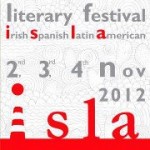 La primera actividad en el Festival Literario ISLA será una discusión literaria, que tendrá lugar el 3 de Noviembre a las 11:30 en el Café Literario.
La primera actividad en el Festival Literario ISLA será una discusión literaria, que tendrá lugar el 3 de Noviembre a las 11:30 en el Café Literario.
Temas como la identidad y la memoria, la violencia o el humor serán tratados por los invitados Ita Daly, Christopher Domínguez Michael, Rafael Gumucio y Catherine Dunne, con la moderación de Ciaran Cosgrove (Trinity College Dublin).
Ita Daly (Drumshanbo, Leitrim, Irlanda) ha publicado cinco novelas, una colección de cuentos y dos libros infantiles. Ha recibido el premio Hennessy Literary Award y el Irish Times Short Story Award. Su obra ha sido traducida al sueco, danés, japonés, italiano y alemán y sus relatos cortos han aparecido en revistas de Irlanda, Inglaterra y Estados Unidos. Uno de sus libros de relatos, The Lady With the Red Shoes, forma parte del plan de estudios de las escuelas de secundaria alemanas.
Christopher Domínguez Michael (Ciudad de México, México, 1962), historiador y ensayista, es uno de los más conocidos críticos literarios hispanoamericanos. Es autor de numerosas publicaciones, siendo su última publicación Profetas del pasado. Quince voces sobre la historiografía de México (2011). Es miembro del Sistema Nacional de Creadores de Arte desde 1993. Su Diccionario crítico de la literatura mexicana, 1955–2005 ha sido traducido y actualizado al inglés en 2012.
Rafael Gumucio (Santiago, Chile, 1970) ha trabajado como periodista en numerosos diarios nacionales chilenos, españoles y en el New York Times. En 1995 publicó el libro de relatos Invierno en la Torre y Memorias Prematuras. Ha publicado también las novelas Comedia Nupcial, Los Platos Rotos y Páginas Coloniales. Su última novela es La Deuda (2009). Actualmente es Director del Instituto de Estudios Humorísticos de la Universidad Diego Portales y co-conductor de Desde Zero en Radio Zero.
Catherine Dunne (Dublín, 1954), estudió inglés y español en Trinity College de Dublín. Su primera novela, In the Beginning, fue publicada en 1997. Le siguió A Name for Himself, finalista del premio Kerry Fiction Prize. Ha publicado otras seis novelas, The Walled Garden (2000), Another Kind of Life (2003), Something Like Love (2006), At a Time Like This(2007), Set in Stone (2009), Missing Julia (2011) y el ensayo An Unconsidered People: The Irish in Sixties London (2003). Sus novelas The Walled Garden (El jardín vallado) y A Name for Himself (Un nombre propio) han sido traducidas al español.
The first event in 3rd November of ISLA Literary Festival is a literary discussion, and it will take place at Café Literario at 11:30.
Topics such as identity and memory, violence or humour will be dealt with by guests Ita Daly, Christopher Domínguez Michael, Rafael Gumucio and Catherine Dunne, chaired by Ciaran Cosgrove (Trinity College Dublin).
Ita Daly (Drumshambo, Co. Leitrim) has published five novels, one collection of short stories and two books for children. She has won two Hennessy Literary Awards and an Irish Times Short Story Award. Her last novel, Unholy Ghosts (1997), was long listed for the International IMPAC Dublin Literary Award. Her work has been translated into Swedish, Danish, Japanese, Italian and German and her short stories have appeared in magazines in Ireland, England and America. Her short story collection The Lady With the Red Shoes (1980) is currently on the secondary school curriculum in Germany.
Christopher Domínguez Michael (Mexico City, Mexico, 1962) is a historian and essayist, and also one of the most famous Hispanic-American literary critics. He is the author of several works, being his latest novel Profetas Del Pasado. Quince Voces Sobre La Historiografía De México was published in 2011. He is a member of the Sistema Nacional de Creadores de Arte (National System for Art Creators) since 1993. His work Diccionario Crítico de la Literatura Mexicana, 1955-2005 (Critical Dictionary of Mexican Literature, 1955–2010) has been translated into English and was updated in 2012.
Rafael Gumucio (Santiago, Chile, 1970) has worked as a journalist for many Chilean and Spanish newspapers, as well as the New York Times. In 1995 he published the collection of short stories Invierno en la Torre and Memorias prematuras. He also published the novels Comedia Nupcial, Los Platos Rotos and Páginas Coloniales. His latest novel, La Deuda, was published in 2009. He now works as the director of the Institute for Humour Studies of the University Diego Portales and is co-conductor of Desde Zero at the radio station Zero. He received the Anna Seghers Award in Germany in 2002.
Catherine Dunne (Dublin, 1954). She studied English and Spanish at Trinity College, Dublin. Her first novel, In the Beginning, was published in 1997. A Name for Himself followed a year later, and was short listed for the Kerry Fiction Prize. She has published six further novels, The Walled Garden (2000),Another Kind of Life (2003), Something Like Love(2006), At a Time Like This (2007), Set in Stone(2009), Missing Julia (2011) and the non-fiction bookAn Unconsidered People: The Irish in Sixties London(2003). Her novels The Walled Garden (El jardín vallado) and A Name for Himself (Un nombre propio) have been translated into Spanish.
Hoy leemos con | Today we are reading with: Harry Clifton, Omar Pérez, Lorna Shaughnessy y Diego Valverde Villena
La segunda actividad del Festival ISLA es un estupendo recital poético que podrás disfrutar el 2 de noviembre a partir de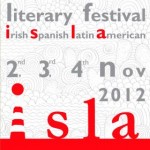 las 17:15 en el Café Literario.
las 17:15 en el Café Literario.
Estos cuatro poetas han seleccionado algunos de sus mejores poemas a los que pondrán su voz en este recital en versión original. Presenta: Bill Richardson (NUI Galway).
Harry Clifton (Dublín, 1952) ha vivido una parte importante de su vida fuera de Irlanda (Nigueria, Extremo Oriente, Italia…) De su estancia en Italia publicó sus memorias en prosa On the Spine of Italy. En 2004 regresó a Irlanda. Entre sus colecciones de poemas se encuentran The Desert Route: Selected Poems 1973-1988 y Secular Eden: Paris Notebooks 1994-2004. También es autor de una colección de ficción, Berkeley’s Telephone and Other Fictions(2000). Clifton fue nombrado Ireland Chair of Poetry en el 2010. Ha recibido también el premio de poesía Patrick Kavanagh y dos premios Arts Council Bursaries de literatura. Sus obras han sido traducidas a varias lenguas europeas.
Lorna Shaughnessy (Belfast, Irlanda del Norte, 1961) es poeta, traductora y profesora de Lengua Española en la Universidad Nacional de Irlanda, Galway. Ha publicado dos libros de poemas, Torching the Brown River (2009) y Witness Trees (2011) y dos traducciones de poesía contemporánea mexicana,Mother Tongue: Selected Poems by Pura López Colomé y If We Have Lost our Oldest Tales, de María Baranda (2006). Su traducción de The Disappearance of Snow de Manuel Rivas fue publicada en 2012.
Omar Pérez (La Habana, Cuba, 1964) es poeta, ensayista y traductor, además de periodista, crítico de teatro y cine, editor y locutor de radio. Su última publicación es la colección de ensayos El corazón mediterráneo (2011). Como poeta ha publicado Algo de lo sagrado (1996), ¿Oíste hablar del gato de pelea? (1999), Canciones y Letanías (2002) y Lingua Franca (2009). En inglés ha publicado Something of the Sacred (2007), traducción de Algo de lo sagrado, a cargo de Kristin Dykstra y Did you hear about the fighting cat? (2010).
Diego Valverde Villena (Lima, Perú, 1967). Poeta español y peruano, de ascendencia boliviana. En 2011 publicó su libro de poemas Un segundo de vacilación. Ha traducido obras de Conan Doyle, Kipling, John Donne, Ezra Pound, Valery Larbaud, Nuno Júdice, E.T.A. Hoffmann y Paul Celan, entre otros. Sus poemas aparecen en numerosas antologías y han sido traducidos a varios idiomas, entre ellos al irlandés. Entre sus principales obras de poesía se encuentran: El difícil ejercicio del olvido(1997), No olvides mi rostro (2001) y El espejo que lleva mi nombre escrito (2006).
The second event of the ISLA Festival will be an outstanding poetry reading on November 2nd at 5.15pm at Café Literario.
These four poets will be reading a selection of some of their best poems in their original language in this poetry reading. Introduced by Bill Richardson (NUI Galway)
Harry Clifton (Dublin, 1952) has spent great part of his life outside of Ireland (Nigeria, Far East, Italy…). He documented the time spent in Italy in his prose memoir On the Spine of Italy. In 2004, he returned to Ireland. His collections of poems include The Desert Route: Selected Poems 1973-1988 and Secular Eden: Paris Notebooks 1994-2004. He is also the author of a collection of fiction, Berkeley’s Telephone and Other Fictions (2000). He was appointed as the Ireland Chair of Poetry in 2010. His other honors include the Patrick Kavanagh Poetry Award and two Arts Council Bursaries in Literature. His work has been translated into several European languages.
Omar Pérez (Havana, Cuba, 1964) is a poet, essayist and translator, as well as a journalist, theatre and film critic, editor and radio announcer. His last publication was the collection of essays El corazón mediterráneo (2011). As a poet he publishedAlgo de lo sagrado (1996), ¿Oíste hablar del gato de pelea? (1999), Canciones y Letanías (2002) andLingua Franca (2009). In English he publishedSomething of the Sacred (2007), the translation ofAlgo de lo Sagrado by Kristin Dykstra, and Did You Hear About The Fighting Cat? (2010).
Lorna Shaughnessy (Belfast, Northern Ireland, 1961) is a poet, translator and lecturer in Spanish in the National University of Ireland, Galway. She has published two collections of poems, Torching the Brown River (2009) and Witness Trees (2011) and two translations of contemporary Mexican poetry,Mother Tongue: Selected Poems by Pura López Colomé and If We Have Lost our Oldest Tales by María Baranda, (2006). Her translation of Manuel Rivas’ The Disappearance of Snow, was published in 2012.
Diego Valverde Villena (Lima, Peru, 1967) is a Spanish and Peruvian poet of Bolivian descent. In 2011 he published his book of poems Un segundo de vacilación. He has translated, among others, works of Conan Doyle, Joseph Rudyard Kipling, John Donne, Ezra Pound, Valery Larbaud, Nuno Júdice, E.T.A. Hoffmann and Paul Celan. His poems appear in many compilations and have been translated into several languages, including Irish. His most famous works in poetry are El difícil ejercicio del olvido (1997), No olvides mi rostro (2001) and El espejo que lleva mi nombre escrito (2006).
Mesa redonda: Literatura fantástica y poesía. De Cortázar a Beckett, pasando por Borges | Round Table: Poetry and fantastic literature. From Cortázar to Beckett, including Borges along the way
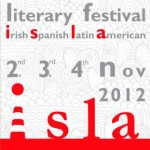 Abrimos el festival ISLA con esta mesa redonda en la que los invitados Elia Barceló, Harry Clifton y María Negroni hablarán sobre literatura fantástica y poesía, sus influencias y mucho más con Jean-Philippe Imbert (DCU). No te puedes perder esta cita el próximo día 2 de noviembre a las 16:00 horas en el Café Literario.
Abrimos el festival ISLA con esta mesa redonda en la que los invitados Elia Barceló, Harry Clifton y María Negroni hablarán sobre literatura fantástica y poesía, sus influencias y mucho más con Jean-Philippe Imbert (DCU). No te puedes perder esta cita el próximo día 2 de noviembre a las 16:00 horas en el Café Literario.
Elia Barceló (Alicante, España, 1957) ha publicado novelas policíacas, históricas, de ciencia ficción y género fantástico para adultos, así como novelas para jóvenes y ensayos. Ha recibido el Premio Gabriel 2007, galardón reservado para las más importantes personalidades del género fantástico en España. Ha sido traducida al francés, italiano, alemán, catalán, inglés, griego, húngaro, holandés, danés, noruego, sueco, croata, portugués, euskera, checo, ruso y esperanto. Sus novelas traducidas al inglés hasta la fecha son: Corazón de tango (2007), traducida al inglés como Heart of Tango (2010) y The Goldsmith’s Secret (2011), traducción de El secreto del orfebre (2003).
Harry Clifton (Dublín, 1952) ha vivido una parte importante de su vida fuera de Irlanda (Nigeria, Extremo Oriente, Italia…). De su estancia en Italia publicó sus memorias en prosa On the Spine of Italy. En 2004 regresó a Irlanda. Entre sus colecciones de poemas se encuentran The Desert Route: Selected Poems 1973-1988 y Secular Eden: Paris Notebooks 1994-2004. También es autor de una colección de ficción, Berkeley’s Telephone and Other Fictions(2000). Clifton fue nombrado Ireland Chair of Poetry en 2010. Ha recibido también el premio de poesía Patrick Kavanagh y dos premios Arts Council Bursaries de literatura. Sus obras han sido traducidas a varias lenguas europeas.
María Negroni (Rosario, Argentina, 1951) es poeta, ensayista y novelista. Como poeta, ha publicado, entre otros libros: Islandia, El viaje de la noche, Arte y Fuga, La Boca del Infierno y Cantar la nada. También ha publicado varios libros de ensayos y dos novelas. Ha traducido, entre otros, a Emily Dickinson, Louise Labé, Valentine Penrose, Georges Bataille, H.D., Charles Simic y Bernard Noël, y la antología de mujeres poetas norteamericanas La pasión del exilio(2007). Su libro Islandia recibió el premio del PEN American Center en Nueva York al mejor libro de poesía en traducción del año (2001) y Galería Fantástica recibió el Premio Internacional de Ensayo de Siglo XXI (México). Su obra ha sido traducida al inglés, francés, sueco e italiano.
The ISLA festival will kick off with this round table where guests Elia Barceló, Harry Clifton and María Negroni will discuss poetry and fantastic literature, its influences and much more with Jean-Philippe Imbert (DCU). This event will be held the 2nd of November at 4pm at our Café Literario.
Elia Barceló (Alicante, Spain, 1957) has published crime, historical, science fiction and fantastic novels for adults, as well as young adult books and essays. In 2007 she received the Gabriel Award, a prize for the most important personalities in the fantastic genre in Spain. Her work has been translated into French, Italian, German, Catalan, English, Greek, Hungarian, Dutch, Danish, Norwegian, Swedish, Croatian, Portuguese, Basque, Czech, Russian and Esperanto. Her novels translated into English are: Corazón de tango (2007), translated into English under the nameHeart of Tango (2010) and The Goldsmith’s Secret(2011), a translation of El secreto del orfebre (2003).
Harry Clifton (Dublin, 1952) has spent great part of his life outside of Ireland (Nigeria, Far East, Italy…). He documented the time spent in Italy in his prose memoir On the Spine of Italy. In 2004, he returned to Ireland. His collections of poems include The Desert Route: Selected Poems 1973-1988 and Secular Eden: Paris Notebooks 1994-2004. He is also the author of a collection of fiction, Berkeley’s Telephone and Other Fictions (2000). He was appointed as the Ireland Chair of Poetry in 2010. His other honors include the Patrick Kavanagh Poetry Award and two Arts Council Bursaries in Literature. His work has been translated into several European languages.
María Negroni (Rosario, Argentina, 1951) is a poet, essayist and novelist. She has published numerous poetry books: Islandia, El viaje de la noche, Arte y Fuga, La Boca del infierno and Cantar la nada, to mention just a few. She is also author of several essays and two novels. She has translated several poets: Emily Dickinson, Louise Labé, Valentine Penrose, Georges Bataille, H.D., Charles Simic and Bernard Noël, as well as the anthology of 20th century North American women poets La Pasión del Exilio (2007). Her book Islandia received the 2001 PEN American Center Award for best book of poetry in translation. She was awarded the 21st Century International Essay Prize (Mexico) for her bookGalería Fantástica. Her work has been translated into English, French, Swedish and Italian.
Festival Literario ISLA / ISLA Literary Festival
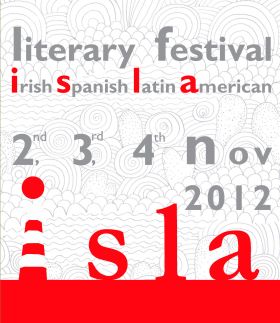 Irlanda es una isla grande y fértil. Una isla sembrada de escritores y de buena literatura. Un escritor, en algún momento de su labor creativa, también ha de convertirse en una isla, retirarse en silencio hasta el lugar en donde se encuentran las palabras, esas mismas palabras que luego descubrirá algún lector solitario, como un tesoro en una isla pirata, un tesoro en forma de libro.
Irlanda es una isla grande y fértil. Una isla sembrada de escritores y de buena literatura. Un escritor, en algún momento de su labor creativa, también ha de convertirse en una isla, retirarse en silencio hasta el lugar en donde se encuentran las palabras, esas mismas palabras que luego descubrirá algún lector solitario, como un tesoro en una isla pirata, un tesoro en forma de libro.
Un buen libro es una isla que contiene el universo.
ISLA es también el nombre que hemos querido dar a nuestro festival de literatura. Es el acrónimo de “Irish, Spanish and Latin American” Literary Festival. Es por tanto, también, una ISLA grande, fértil y multicultural en la que estamos todos unidos, irlandeses, latinoamericanos y españoles, por primera vez, en torno a la literatura.
Nunca antes se había celebrado un festival de estas características. Sin embargo, creemos que hacía ya mucho tiempo que venía siendo necesario. Hoy, gracias al entusiasmo demostrado tanto por Dublin UNESCO City of Literature, Ireland Literature Exchange, Poetry Ireland y el apoyo de las universidades Dublin City University, NUI Galway, NUI Maynooth y Trinity College Dublin, como por las embajadas de Argentina, Chile, Cuba, México y por supuesto por la Embajada de España, de la que el Instituto Cervantes forma parte, este festival es una realidad. Solo podemos tener palabras de agradecimiento para todos ellos.
Y aquí estamos todos, unidos en este proyecto. Comprometidos, comunicados, reunidos en este hermoso territorio común en el que hemos depositado tantas ilusiones.
No tiene sentido que algunas de las literaturas más fecundas del planeta sigan viviendo de espaldas entre sí. Es necesario que del intercambio de experiencias e ideas, de un mejor conocimiento entre unos y otros surjan nuevas traducciones, nuevos libros y, sobre todo, nuevos lectores.
Bienvenidos a nuestra ISLA.
Ireland is a great and fertile Island. It is an Island cultivated with writers and high quality literature. A writer during the course of his creative work must also become an island, withdrawing in silence to a place where words are kept. Those same words which some solitary reader will discover like hidden treasure on a pirate island, treasure in the form of a book.
A good book is a universe within an island.
The Spanish for ‘island’ is ‘ISLA’. It is the name we have chosen for our Literary Festival. It is the acronym for ‘Irish, Spanish and Latin American’ Literary Festival. It is also in that way a great, fertile and multicultural island where the Irish, Latin Americans and Spanish for the first time are all united and gathered around literature.
Never before has such a festival taken place. However, we believe it to be a much needed, unique event that has been a long time coming. Today, and thanks to the enthusiasm of Dublin UNESCO City of Literature, Ireland Literature Exchange, Poetry Ireland and the support of Dublin City University, Trinity College Dublin, NUI Galway, NUI Maynooth, the Embassies of Argentina, Mexico, Chile and Cuba, and by the Spanish Embassy, of which Instituto Cervantes is a part, this Festival is now a reality. We can only offer words of sincere gratitude to all of them.
We are all here, united in this project. Committed, connected and gathered together in this beautiful shared place where we have invested so many dreams.
It does not make sense that some of the most fertile literary figures on the planet should live in disregard for one another. It is imperative that from the exchange of experiences and ideas and from a better understanding between one another, new translations, new literature and, above all, new readers should emerge.
We wish you a warm welcome to our ‘island’ ISLA.
Audiolibro de la semana | Audiobook of the week: Libro del mal amor
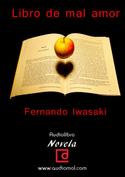 Esta semana te traemos en forma de audiolibro la primera novela del escritor y periodista peruano Fernando Iwasaki: Libro del mal amor. Para descargarte este audiolibro solamente tienes que tener el carnet en vigor de la biblioteca y hacer click aquí. Así conocerás a su personaje principal de una forma original y divertida: a través de las mujeres que no lo han amado.
Esta semana te traemos en forma de audiolibro la primera novela del escritor y periodista peruano Fernando Iwasaki: Libro del mal amor. Para descargarte este audiolibro solamente tienes que tener el carnet en vigor de la biblioteca y hacer click aquí. Así conocerás a su personaje principal de una forma original y divertida: a través de las mujeres que no lo han amado.
La poco afortunada vida amorosa del protagonista se nos presenta en diez capítulos que llevan el nombre de otras tantas mujeres que le han dado calabazas a lo largo de los años. Experiencias que no sólo tienen un lado negativo pues son asumidas con gran sentido del humor.
A través de esta hilarante crónica de fracasos amorosos, el protagonista, en su afán por perseguir a la mujer de sus sueños se convierte en deportista, patinador, político universitario, vegetariano, judío y experto en ballet. Estas circunstancias lo llevan a vivir insospechadas y sorprendentes situaciones desarrolladas en la década de los 70 y principios de los 80.
This week we bring you a new audiobook, the fist novel of Peruvian writer and journalist Fernando Iwasaki: Libro del mal amor. To download this audiobook you only need to have a valid library card and make click here. You will get to know the main character of the story in an original and funny way: through the women who did not love him.
The unlucky love life of this man is shown in ten chapters named after ten women who rejected him through the years. These experiences don´t have just a negative side as they are received with a great sense of humour.
The protagonist lives a hilarious chronicle of love failures and in his attempt to chase the woman of his dreams he becomes a sports man, skater, politician, university student, vegetarian, Jewish and ballet dancer. These circumstances lead him to live unexpected and surprising experiences during the 70s and early 80s.
Audiolibro de la semana / Audiobook of the week: La hora azul
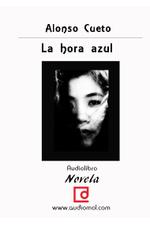 Una nueva novela en audio para un nuevo fin de semana que se presenta un tanto gris. Puedes descargarlo ahora mismo y escucharlo en cualquier reproductor de MP3. Ya sabes, si tu lengua nativa no es el español, esta es una buena forma de practicar y afinar el oído. Esta semana te proponemos la novela de Alonso Cueto titulada La hora azul. La tienes a un solo clic de distancia.
Una nueva novela en audio para un nuevo fin de semana que se presenta un tanto gris. Puedes descargarlo ahora mismo y escucharlo en cualquier reproductor de MP3. Ya sabes, si tu lengua nativa no es el español, esta es una buena forma de practicar y afinar el oído. Esta semana te proponemos la novela de Alonso Cueto titulada La hora azul. La tienes a un solo clic de distancia.
La hora azul cuenta la historia del doctor Adrián Ormache, un abogado próspero que vive en una zona acomodada de Lima. Tiene un buen sueldo, un trabajo estable y una familia encantadora. Al cuidado de su madre, su infancia también ha transcurrido sin problemas. Adrián sólo ha visto esporádicamente a su padre, de cuyas hazañas como oficial de la marina peruana ha oído hablar.
Tras su fallecimiento, Adrián descubre, sin embargo, que su padre estuvo a cargo de un cuartel en la zona de Ayacucho, durante la guerra de Sendero Luminoso. Gracias a ex subordinados suyos, se entera, además, de que ordenaba las sesiones de tortura y mandaba violar y ejecutar a las prisioneras. Pero en una ocasión su padre le perdonó la vida a una de ellas, que luego se escapó del cuartel. Adrián se propone conocerla.
Alonso Cueto Caballero nació el 30 de abril de 1954 en la ciudad de Lima (Perú). Debido al trabajo de su padre, pasó su infancia viviendo en Paris y Washington. A los siete años, volvió a vivir en Lima.
En 1977 se graduó en la facultad de literatura de la Universidad Católica del Perú con una tesis sobre la obra de Emilio Adolfo Westphalen. Ese mismo año, viajó a España con una beca del Instituto de Cultura Hispánica, para realizar un trabajo de investigación entorno a la obra de Luis Cernuda. En 1979 reinició sus estudios en la Universidad de Texas en Austin, de donde se graduó con el título de PhD, en 1984, con una tesis sobre los relatos de Juan Carlos Onetti. En 1985 se casa con Kristin Keenan Atwood con la cual tiene dos hijos, Daniel (1986) y Esteban (1991). Actualmente reside en Lima, Perú.
The Blue Hour tells the story of Dr. Adrian Ormache, a prosperous lawyer who lives in a wealthy area of Lima. He has a good salary, a stable job and a lovely family. His childhood has also gone smoothly, but Adrian has only sporadically seen his father, worked as a Peruvian naval officer.
After his death, Adrian discovers that his father was in charge of a barracks in the Ayacucho region, during the war of Sendero Luminoso. Thanks to former subordinates, he learns also that his father ordered the torture sessions and the rape and execution of the prisoners. But once his father spared one, a misterous woman that later escaped from the barracks. Adrian intends to meet her.
Alonso Cueto (Lima, 1954) is the author of several novels, short stories and essays. He recently published a study on Uruguayan writer Juan Carlos Onetti, El Soñador en la Penumbra (Fondo Cultural Económica, 2009). Cueto has won several distinctions for his literary work, including the prestigious Herralde Award (Spain 2005) for his novel La Hora Azul (The Blue Hour), the 2007 Casa de Ámericas-Planeta second-place prize for his novel Susurro de la Mujer Ballena (Sigh of the Whale Woman) and the Anna Seghers Prize for his body of work (Germany, 2000). He also received a John Simon Guggenheim Foundation grant in 2002.
Filmmaker Francisco Lombardi adapted Cueto’s novel Grandes Miradas (Knowing Gazes) to the screen in “Mariposa Negra,” which won several international awards. Cueto’s work has been translated into 15 languages, including Chinese and Korean. Random House recently bought the rights for the English-language translation of La Hora Azul. Cueto lives in Lima, Peru, where he teaches literature and writing workshops at the Universidad Católica.
Mario Vargas Llosa y Seamus Heaney en el Instituto Cervantes de Dublín / Mario Vargas Llosa and Seamus Heaney at the Instituto Cervantes in Dublin
El pasado lunes, antes del encuentro literario que tuvo lugar en el Instituto Cervantes de Dublín con Mario Vargas Llosa y Juan Cruz, dos grandes de la literatura, dos premios Nobel, se reunieron en la Biblioteca del Instituto Cervantes de Dublín.
En el video, Mario Vargas Llosa y Seamus Heaney intercambian comentarios sobre su obra y sobre su experiencia en Estocolmo, adonde viajaron para recibir el galardón de la academia sueca.
La velada literaria tuvo lugar a continuación de este encuentro, con motivo de la presentación en el Instituto Cervantes de Dublín de la traducción al inglés de El sueño del celta (The dream of the Celt), la última novela de Mario Vargas Llosa.
Mario Vargas Llosa, Premio Nobel de Literatura en 2010, Premio Cervantes en 1994 y Premio Príncipe de Asturias de las Letras en 1986, es uno de los más importantes novelistas y ensayistas contemporáneos. Nacido en Arequipa, Perú, en 1936, viajó a España en 1959 gracias a una beca para realizar un doctorado en la Universidad Complutense de Madrid.
Ese mismo año, vio la luz su primera publicación, Los jefes, un conjunto de cuentos que obtuvieron el premio Leopoldo Alas. Sin embargo, no sería hasta la década de 1960 cuando publicó tres de las obras que lo lanzaron a la fama: La ciudad y los perros (1962), La casa verde (1965) y Conversación en La Catedral (1969). En 2010, tras recibir el Premio Nobel, publicó El sueño del celta, en la que se cuenta la peripecia vital de un hombre de leyenda: el irlandés Roger Casement, uno de los primeros europeos en denunciar los horrores del colonialismo.
Last Monday, before the literary evening at the Instituto Cervantes in Dublin with Mario Vargas Llosa, and Juan Cruz , two literary great writers, two Nobel laureates, gathered at the Instituto Cervantes Library in Dublin.
In this video, Mario Vargas Llosa and Seamus Heaney exchange comments about their work and their experience in Stockholm, when they traveled there to receive the award from the Swedish Academy.
The literary evening ensued on the occasion of the presentation of the English translation of El sueño del celta (The dream of the Celt) at the Instituto Cervantes in Dublin.
The dream of the Celt is Mario Vargas Llosa’s latest novel, where he tells the life story of a legendary man: the Irish Roger Casement, one of the first Europeans to denounce the horrors of colonialism.
Mario Vargas Llosa, Nobel Prize in Literature 2010, Cervantes Award 1994, Príncipe de Asturias de las Letras Award 1986, is one of the most significant contemporary novelists and essayists.
Mario Vargas Llosa was born in 1936 in Arequipa (Peru). He travelled to Spain in 1959 thanks to a bursary to complete a doctorate at Complutense University in Madrid.
On the same year, he published his first work, Los jefes, a compilation of stories. It is not, however, until the 60´s when he published three of the works that launched him to fame: La ciudad y los perros in 1962, La casa verde in 1965 and Conversación en La Catedral in 1969.
Following a period of intense political activity, he returned to writing in 1993 with his book of memoirs El pez en el agua. In 2010, he published The dream of the celt.
El hombre que se atrevió a soñar / The man who dared to dream
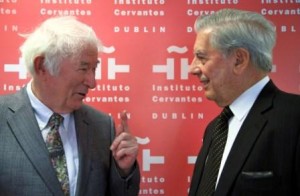 Hoy hemos recibido a Mario Vargas Llosa en el Instituto Cervantes de Dublín. El premio Nobel de Literatura 2010 ha charlado con Juan Cruz ante más de doscientas personas acerca de su última novela, El sueño del celta y su protagonista, Roger Casement.
Hoy hemos recibido a Mario Vargas Llosa en el Instituto Cervantes de Dublín. El premio Nobel de Literatura 2010 ha charlado con Juan Cruz ante más de doscientas personas acerca de su última novela, El sueño del celta y su protagonista, Roger Casement.
Durante la velada, también hubo tiempo para reflexionar acerca de la banalización de la cultura, a propósito de la reciente publicación del libro de ensayo de Vargas Llosa que lleva por título La civilización del espectáculo, y por supuesto para saludar y conversar con su viejo amigo, Seamus Heaney.
El pasado fin de semana se publicó en el Irish Times una elogiosa crítica de El sueño del celta, publicado en inglés por Faber and Faber. El resumen de la conferencia que retransmitimos a través de twitter se puede consultar en: http://storify.com/icdublin/en
Tonight Instituto Cervantes Dublin hosted Mario Vargas Llosa. Over 200 guests listened to the laureate of the 2010 Nobel Prize in Literature chat to Juan Cruz about his recent novel “The Dream of the Celt” and its protagonist Roger Casement.
During the evening there was also an occasion to reflect on trivialization of culture, alluding to Vargas Llosa’s recent book of essays “Civilization of the spectacle”, and to say hello to his old friend Seamus Heaney.
Last weekend The Irish Times featured a laudatory review on The Dream of the Celt published in English by Faber & Faber. The conference transmitted live on twitter is available here: http://storify.com/icdublin/en
Encuentro Literario con Mario Vargas Llosa / Literary evening with Mario Vargas Llosa
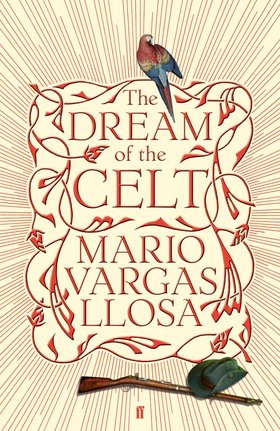 Premio Nobel de Literatura en 2010, Premio Cervantes en 1994, Premio Príncipe de Asturias de las Letras en 1986… éstos son tres ejemplos de los muchos reconocimientos que ha recibido a lo largo de su carrera como escritor Mario Vargas Llosa, uno de los más importantes novelistas y ensayistas contemporáneos. El Instituto Cervantes de Dublín se complace en invitarte a asistir a una conversación entre este magnífico escritor y Juan Cruz.
Premio Nobel de Literatura en 2010, Premio Cervantes en 1994, Premio Príncipe de Asturias de las Letras en 1986… éstos son tres ejemplos de los muchos reconocimientos que ha recibido a lo largo de su carrera como escritor Mario Vargas Llosa, uno de los más importantes novelistas y ensayistas contemporáneos. El Instituto Cervantes de Dublín se complace en invitarte a asistir a una conversación entre este magnífico escritor y Juan Cruz.
Mario Vargas Llosa, nuestro autor del mes de junio, nació en 1936 en Arequipa (Perú). En 1959 viajó a España gracias a una beca para hacer un doctorado en la Universidad Complutense de Madrid, donde obtuvo el título de Doctor en Filosofía y Letras.
Ese mismo año, vio la luz su primera publicación, Los jefes, un conjunto de cuentos que obtienen el Premio Leopoldo Alas. Sin embargo, no será hasta la década de 1960 cuando publique tres de las obras que lo lanzaron a la fama: La ciudad y los perros (1962), La casa verde (1965) y Conversación en La Catedral (1969).
En 2010, la editorial Alfaguara publica El sueño del celta, en la que se cuenta la peripecia vital de un hombre de leyenda: el irlandés Roger Casement, uno de los primeros europeos en denunciar los horrores del colonialismo. Esta novela, traducida al inglés, ha sido publicada por la editorial Faber and Faber a principios de junio de 2012 bajo el título The dream of the celt.
Mario Vargas Llosa conversará con Juan Cruz, periodista y escritor español que en la actualidad ocupa el cargo de adjunto a la dirección del diario El País. Su primera novela fue publicada en 1972 bajo el título Crónica de la nada hecha pedazos. Ha participado en radio y televisión y también en numerosas conferencias y cursos.
Para asistir a este encuentro es necesario presentar invitación. Para conseguirla, pregunta por favor al bibliotecario: bibdub@cervantes.es. ¡Pero date prisa, que se acaban!
Nobel Prize in Literature 2010, Cervantes Award 1994, Príncipe de Asturias de las Letras Award 1986… three examples of the many awards that Mario Vargas Llosa has received during his writing career. He is one of the most significant contemporary novelists and essayists. Instituto Cervantes Dublin is proud to invite you to a conversation with this outstanding author and the Spanish writer Juan Cruz.
Mario Vargas Llosa, our author of the month in june, was born in 1936 in Arequipa (Peru), travelled to Spain in 1959 thanks to a bursary to complete a doctorate by the Complutense University of Madrid where he was awarded a Doctorate in Philosopy and Literature.
On the same year, he published his first work, Los jefes (The leaders), a compilation of stories. He was awarded the Leopoldo Alas prize for this piece. It is not, however, until the 60´s when he published three of the works that launched him to fame: La ciudad y los Perros (The City and the Dogs) in 1962, La casa verde (The Green House) in 1965 and Conversación en La Catedral (Conversation in the Cathedral) in 1969.
Following a period of intense political activity, he returned to writing in 1993 with his book of memoirs El pez en el agua (A Fish in the Water).
Alfaguara publishing house launched El sueño del celta in 2010. This is Vargas Llosa’s latest novel where he tells the life story of a legendary man: the Irish Roger Casement, one of the first Europeans to denounce the horrors of colonialism. This novel has been translated into English and is due to be published by Faber and Faber at the beginning of June 2012 with the title The dream of the Celt.
Juan Cruz, Spanish journalist and writer, is Assistant Director at the Spanish newspaper El País. His first novel was published in 1972 with the title Crónica de la nada hecha pedazos. He has participated in radio, television and in numerous conferences and courses.
Please remember: Strictly by invitation. Ask the librarian for details: bibdub@cervantes.es
Audiolibro de la semana / Audiobook of the week: La isla de los amores infinitos
La isla de los amores infinitos. Esta novela, de tan sugerente título, es nuestra propuesta de audiolibro para esta semana. La tienes a un solo clic de distancia.
El libro cuenta la historia de tres familias de orígenes y culturas dispares que recalan en Cuba y cuyos destinos a lo largo de más de 150 años correrán parejos con los de la bella isla.
Desde el Miami actual, la historia retrocede hasta 1856, cuando entran en contacto los personajes, procedentes de China, España y África, y surge el amor, que hallará una mágica continuidad un siglo más tarde. Una hermosa historia de esperanzas y sueños rotos, de nostalgia, exilio y amores unidos por el destino.
Su autora, Daína Chaviano, nació en La Habana donde se licenció en Lengua y Literatura Inglesa. En 1979 recibió el Premio David de Ciencia Ficción por Los mundos que amo, una colección de cuentos escritos entre los 15 y los 19 años.
En 1982, la autora fundó el primer taller literario de ciencia ficción de América Latina. Más tarde, trabajó como guionista de programas televisivos para niños, jóvenes y adultos. Fue presentadora de televisión y de radio. También participó como actriz en algunas películas de cine independiente.
Mientras vivió en Cuba, publicó varias obras de ciencia ficción y fantasía. Entre sus títulos se encuentran Amoroso planeta (1983), Historias de hadas para adultos (1986), Fábulas de una abuela extraterrestre (1988), La anunciación (1990) y El abrevadero de los dinosaurios (1990).
En mayo de 1991, Chaviano se estableció en Miami, Florida (Estados Unidos), donde aún vive.
Fuera de Cuba ha publicado Confesiones eróticas y otros hechizos (poemas), País de dragones (cuentos) y el ciclo de novelas «La Habana oculta», compuesto por El hombre, la hembra y el hambre, Casa de juegos, Gata encerrada y La isla de los amores infinitos, publicada en 25 idiomas y que se ha convertido en la novela cubana más traducida de todos los tiempos.
La isla de los amores infinitos. This novel, with such a suggestive title, is the audiobook we suggest for this week. Just a click away from you.
The book tells the story of three families of diverse backgrounds and cultures that arrive to in Cuba and whose lifes along more than 150 years will run hand in hand with the history of this beautiful island.
From Miami today, history goes back to 1856 when the characters come into contact, from China, Spain and Africa, and love emerges then and a century later it finds a magic continuation. A beautiful story of hope and broken dreams, nostalgia, exile and love united by fate.
The author, Daína Chaviano, was born in Havana where he graduated in English Language and Literature. In 1979 she received the David Award for Science Fiction for her collection of stories, Los mundos que amo, written when she was a teenager.
In 1982, she founded the first science fiction writing workshop in Latin America. Later she worked as a scriptwriter for television programs for children, youth and adults. She also participated as an actress in several independent films.
While living in Cuba, Daína published several works of science fiction and fantasy. Among his titles are Amoroso planeta (1983), Historias de hadas para adultos (1986), Fábulas de una abuela extraterrestre (1988), La anunciación(1990) y El abrevadero de los dinosaurios (1990).
In May 1991, Chaviano moved to Miami, Florida (United States), where she still lives.
Since then, she has published outside of Cuba Confesiones eróticas y otros hechizos (poems), País de dragones (short stories) and the cycle of novels «La Habana oculta», composed by El hombre, la hembra y el hambre, Casa de juegos, Gata encerrada y La isla de los amores infinitos, published in 25 languages. This novel has become the most translated Cuban novel of all time.
